Alberta has one of the most vibrant economies in the country and despite several months of low oil prices and a shrinking Canadian dollar, business is still booming throughout the northern regions of the province. Mining consortiums and forestry product companies are always on the lookout for new employees and numerous jobs are available in other sectors as well. If you a First Nation or Inuit person living in the Capital Region, seeking a permanent opportunity, take the time to talk to the career counsellors and employment specialists at the Oteenow Employment and Training Society (OETS). They will also steer you in a positive direction even if you don’t know what kind of a career you’d like to pursue.
To be eligible for funding, applicants must be First Nations or Inuit citizens that reside in the OETS geographical area, be unemployed or underemployed and submit a funding application with all required documents at least three weeks prior to the skills training start date. Applicants must be able to enter Skills Training in a demand driven occupation up to a maximum of 52 weeks with the knowledge and a commitment that when Skills Training is completed, employment ensues. Applicants are also required to develop and sign an action plan.
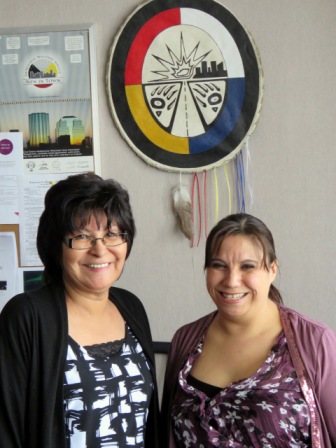
Gloria Anderson and student Sandra Dumais, who is working her practimum at Oteenow’s front desk; Article and photos by John Copley
“If you are looking for employment and/or want to get involved in a trades program, come and see us; no appointments are necessary,” assured OETS Executive Director Gloria Anderson, in a recent interview. “We operate on a first-come first-served basis.”
Oteenow also has five computer stations for people who have a possible job lined up and need to write a letter, complete an application form or email out a resume. In fact, the client Resource Room also offers internet access for job searches, a fax machine, photo copier and resource materials.
Oteenow fulfills its mandate, which is to provide governance and management of First Nations’ urban resources to implement labour market programs and services for the benefit of First Nations members residing in the Edmonton Metropolitan census area.
“We had a total of 4,044 people came through the doors to talk to us about employment-related issues last year,” explained Anderson, who said the pace, in a five-day-a-week, eight-hour-a-day environment was often hectic and always busy. “Our sole purpose is to help clients get employed and stay employed. We are busy but we have great partners and a successful track record.”
Oteenow works to help ensure First Nations people living in the Edmonton Metropolitan Census area are healthy, independent and employed. The Society provides human resource development programs and services to urban Aboriginal people residing in its area to enable them to become self-reliant and subsequently lead productive lives.
Partnerships are in place and would-be workers with a determined mindset, a positive attitude and a willingness to put in the effort it takes to succeed, will do well. But before you can enter into a training or trades program there are some criteria.
“Because everyone’s abilities are different and every job has a different set of criteria, the first thing our clients do is talk to one of our counsellors,” explained Anderson. “They will determine what it is the client wants to achieve then determine if it is a possibility. For example if the job a client wants, calls for a Grade 12 education or for a candidate who passed with honours in Math 30, and the client has a Grade 10 education, he’d have to upgrade to Grade 12 to qualify.”
Likewise, if someone wants to become a journeyman electrician they may need to upgrade their math skills. If a client can meet the requirements needed for the job, and that could include anything from producing a clean driver’s licence to a criminal record check, there’s usually gold at the end of the rainbow.
“There are some definite barriers for our Aboriginal clients,” agreed Anderson, who said that most people know what they are able to do and not do before they come to Oteenow. “Unfortunately, we can’t help everyone attain exactly what they seek, but if you can meet the criteria of a particular employment or training opportunity, you will get an opportunity to succeed.”
Any lifestyle barriers that interfere with a client’s goals must be overcome before Oteenow can offer its services and in some cases Oteenow will assist clients with lifestyle barriers get closer to meaningful work by referring them to organizations who offer more appropriate services.
Anderson said that clients who come to Oteenow for advice, counselling or job placement must meet the criteria and participate in the program as required. Oteenow is accountable to its funders; clients are accountable both to themselves and to meeting Oteenow’s program criteria.
“We can’t process a client’s file until all of the documentation is in place,” she explained, “because we need to have everything in order when we send it in to the government. We are all accountable.”
Security Guards, Peace Officers, Culinary Arts, Heavy Equipment Operator training, Class 1 Driver’s Training, Health Care aides training, including EMR and EMT and many more opportunities are available for the right applicant.
“We also have a partnership with Trade Winds to Success (TWS) and others with NAIT and PTI (Introduction to the Construction Trades); NAIT and Forbes Brothers (Power Line Technician) and NAIT and CIVEO (Camp Cook Program. We are meeting our goal, which is to see 40 First Nation and Inuit students graduate through the TWS pre-trades training program each year.”
The pre-trades training programs includes carpentry, electrical, welding, iron working, boilermaker, steam/pipe fitter and more.
Oteenow employs three Career Counsellors and three Employment Specialists. The first of this group provide the tools and support to clients so that they can develop an action plan with an understanding of the labour market trend and how it will affect such things as interest, values and short and long term planning. For specific occupations, the Career Counsellors also focus on an assessment of technical competencies, occupational skills and previous experience.
The Employment Specialists assist with the creation of an Employment Action Plan that can include such things as resume and cover letter writing, networking with employers and Oteenow’s industry partners, and developing interview skills that will meet the expectations of every employer.
Financial assistance that includes tuition and related costs for skills development training and transportation allowance (on a needed basis) may be available to eligible applicants.
Oteenow receives annual funding through the Aboriginal Skills and Employment Training Strategy (ASETS) agreement, which is provided through and managed by Service Canada.
The Oteenow Employment and Training Society was incorporated as a non-profit society in April 2000, eleven years after the federal economic policy framework began to focus on establishing key programming elements for Aboriginal Economic development by supporting labour market development.
“In April of 1996,” explained Anderson, “responsibility for designing and delivering programs to support Aboriginal Employment and Training was taken over by Aboriginal organizations across Canada, first through Regional Bilateral Agreements (RBA), and after 1999 through the AHRDAs and more recently through the current ASETS (Aboriginal Skills and Employment Training Strategy) agreement.”
During the RBA program, Treaty 6 and Treaty 8 had separate boards and processes for the delivery of employment and training services in the Edmonton Metropolitan Area. By 1998 the Chiefs saw the need to create a First Nations Partnership in Edmonton Urban. This single First Nations authority in Edmonton urban would design and deliver labour market programs through the AHRDA to all First Nations and Inuit people living in Edmonton Urban. Thus, Oteenow Employment and Training Society came into being; it is currently an ASETS holder with a geographical area that includes Metropolitan Edmonton.
Governance comes via the Confederacy of Treaty 6 First Nations and Treaty 8 First Nations of Alberta, each of whom appoints a Board of Directors to the Oteenow Employment and Training Society. Three Treaty 6 representatives (Lloyd Verreault, Roberta Beachhead, Yvette Alexis) and three Treaty 8 representatives (Michelle Voyageur, Trudy Kiyawasew, Joseph Jobin) make up the current Board.
For more information about Oteenow call 780-444-0911 or drop in to # 300, 14925 – 111 Ave in Edmonton.
by John Copley

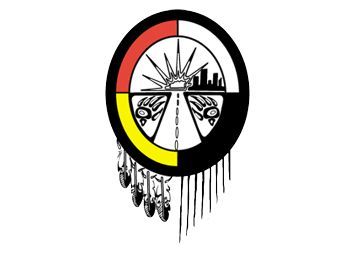
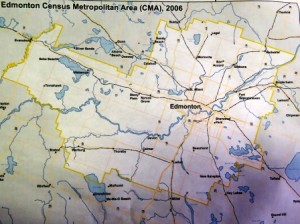
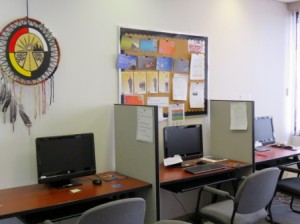
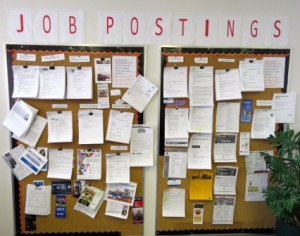

Be the first to comment on "Oteenow offers successful employment strategies"